 written by Eladrin
written by EladrinHello everyone!
In the Overlord Announcement last week we mentioned that vassalization mechanics will be undergoing some significant changes in the 3.4 “Cepheus” update.
Previously in Stellaris, subjugation was rarely a more compelling option than simple conquest, and being subjugated often essentially meant a permanent decline of your empire and a “Game Over” screen in your near future. Subjects did not offer sufficient benefits nor had the freedoms necessary to be enjoyable to play.
The Scion origin from Federations was somewhat of an exception with most of the restrictions on both subjects and overlord being waived for them, but we felt that while the system was good, it could be even better. It would also be nice for the Scion to work within the rules rather than being so “special-cased”.
Some people noted that as part of the unity changes in Libra, a bit more of an argument for spinning off sectors into vassals could be made, but with the current numbers it’s generally more valuable to control those systems directly.
For today’s dev diary, I’ll start by delving deeper into the new rights and responsibilities that can appear in agreements, and some ways this makes keeping subjects more valuable.
As with all previews, numbers, text, and so on are not quite final and are still subject to change.
Negotiating Terms
Both the overlord and subject will be able to propose alterations of the exact terms of their vassalization contract if it’s a contract with another “regular empire”. The Khan, Awakened Empires, and the like do not haggle about the terms of their minions, but are much clearer about those exact terms.
Subject contracts start with a “preset”. These are the basic subjugation types that you know from before, plus a few new ones - Vassal, Subsidiary, Tributary, Protectorate, Bulwark, and so on. Presets have a list of default terms, and can have additional unique effects tied to them, like how Protectorates gain a massive bonus to research until they catch up to their overlord.
The default terms of contract presets may have changed a bit from the old system to better fit the new. We’ve done our best to ensure that anything you can do right now with your vassals remains possible. The core Negotiation system is part of the free Cepheus update, though many of the brand new terms are part of the Overlord expansion.
Negotiable terms include things such as:
Can the subject be integrated?
- As a major change from current gameplay, there are no vassalization contract presets that have integration enabled by default. It must be explicitly turned on in contract negotiations.
Does the subject have independent diplomacy?
- Subjects can be given complete diplomatic freedom, none, or they can have most freedoms except are forced to vote with their overlord in the Galactic Community or Federations.
Can the subject expand freely?
- Once exclusively the province of Feudal Society, now you can grant your subject the ability to freely expand. You can also bar them from expansion, or impose an Influence tithe, making them spend extra Influence (which goes to the Overlord) for the right to expand into empty systems.
- Most presets will start with controlled expansion with the influence tithe as the default term.
Various subsidies from the overlord or tribute from the subject.
- These are broken into Basic, Advanced, or Strategic resource groups, and Research.
- The values are percentages of the production of the subject - in the proposal below, our vassal is offering 15% of their basic resource production as tribute, but is receiving a research subsidy equal to 15% of the subject’s research from the overlord.
Are the overlord and subject drawn into one another’s wars, and if so, which ones?
- None, Offensive, Defensive, or Both can be selected in both directions.
- Yes, this means that wars can be declared on subjects.
Can the overlord build holdings on the subject’s worlds, and if so, how many?
- The Vassal preset has a holding limit of 1, allowing you to use some holdings without Overlord. (Though you can lower it to 0 if you need to squeeze out an extra bit of loyalty.)
- This value is an empire-wide limit - with a holding limit of 3, you can build 3 holdings across a particular subject’s worlds, not on each of their planets.
Does the overlord share sensor information with their subject?
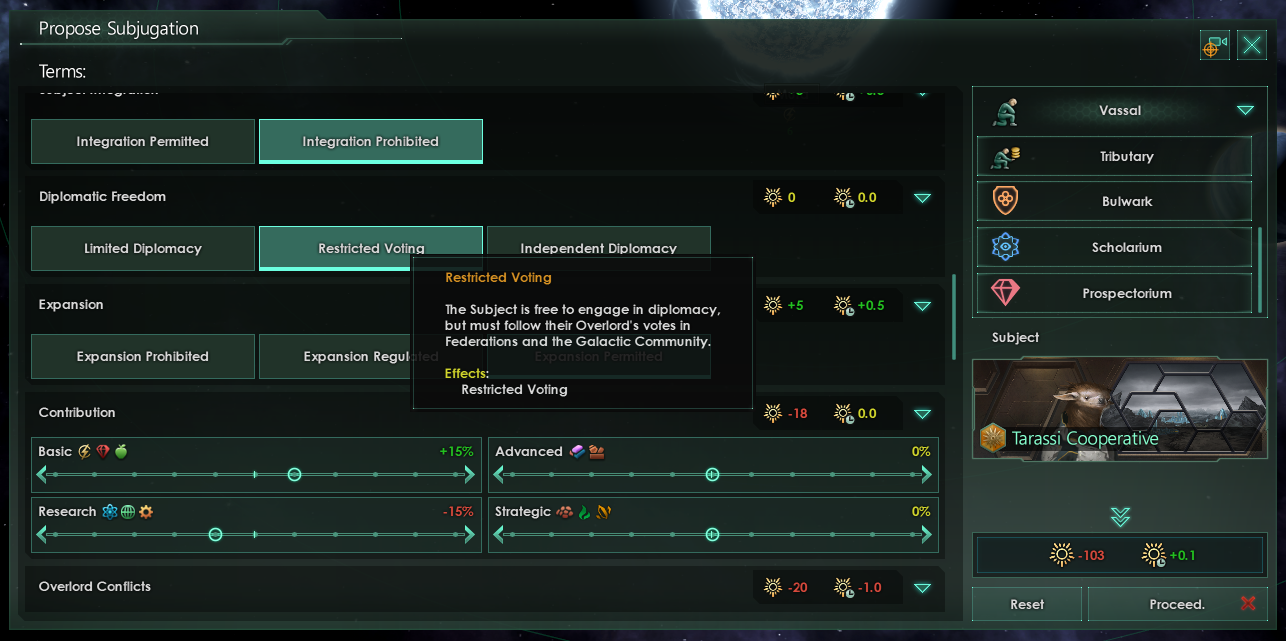
Some subject types have fixed, minimum, or maximum terms - Tributaries, Subsidiaries, and Prospectoria, for example, must always provide their overlord at least 30% of their basic resources (energy, minerals, and food) in tribute.
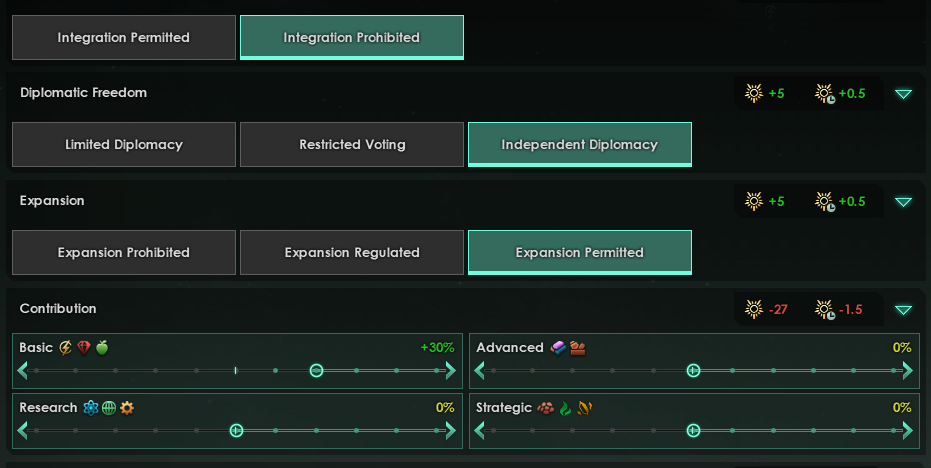 Tributaries have many locked terms.
Tributaries have many locked terms.Others can be restricted by civics or for other reasons - for example, overlords with the Feudal Society civic cannot select the Expansion Prohibited term, must join in their subject wars to some degree, and must allow their subjects some degree of diplomatic freedom.
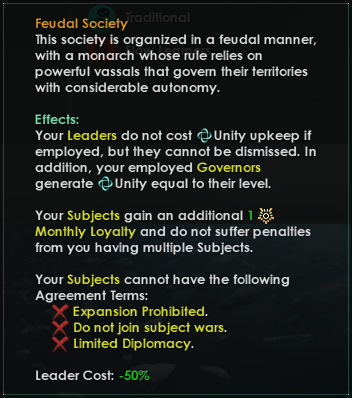
Different terms affect a subject’s Loyalty, and have an immediate impact as well as over time. For example, the Independent Diplomacy term grants 5 Loyalty and another +0.5 Loyalty per month. This may prove important later.
If you’re asking your subject to do something they are ideologically opposed to, those terms may cost extra loyalty, though the reverse is also true in a few cases.
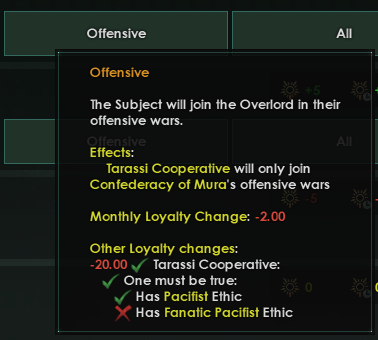 The pacifists don’t like being forced into offensive wars.
The pacifists don’t like being forced into offensive wars.Empires can propose a change in terms with a five year cooldown at a cost of some Influence. Exact costs are still being adjusted.
 We are feeling beneficent today, and want you to catch up to us faster, Protectorate.
We are feeling beneficent today, and want you to catch up to us faster, Protectorate.How can you influence them into accepting your generous offer? Giving them a good deal is certainly helpful, and just like before, empire relations and relative power go a long way as well.
The terms themselves are heavily moddable, I look forward to seeing what some of you come up with.
The Benefits of Loyalty
Loyalty is the “currency” used between overlord and subject, and while the Specialist empires make more use of it than regular vassals, it’s still beneficial to keep your minions loyal since it gives you more options. Loyalty is largely determined by the contract between overlord and subject, but ethical compatibility will come into play as well.
Loyal vassals will agree to more onerous terms during negotiations, and will generally support their overlord. You can also “spend” their loyalty as part of trade agreements, strong-arming them into granting you better than normal trades.
You can request a public Pledge of Loyalty to you from a loyal vassal, making them even more loyal over time.
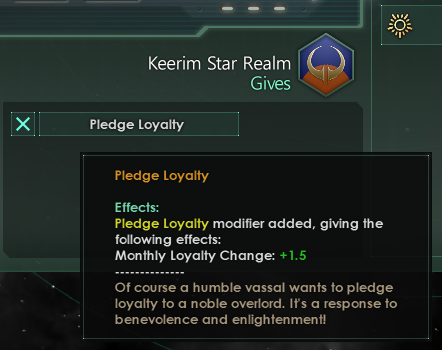 Pledge Loyalty has greater effects if the subject actually likes you for some reason.
Pledge Loyalty has greater effects if the subject actually likes you for some reason.Disloyal vassals will look for ways to be free of your tyranny, seizing the chance for rebellion should you falter.
They may also swear Secret Fealty to one of your rivals in hopes that they’ll be able to follow them in an Allegiance War.

In an Allegiance War, you seek to wrest control of the vassals that have pledged Secret Fealty to you, and they will join in on the attack on their former Overlord.
Gotta Subjugate Them All
Like herding cats, having many vassals is hard work. Constantly vying for your attention, keeping multiple subjects happy can be difficult as jealousy ruins everything. “Divided Patronage” is a modifier that reduces the loyalty of all of your vassals, and increases based on the number of vassals you have.
You can mitigate this by offering them better terms, or by taking a vassalization related civic or the Shared Destiny ascension perk.
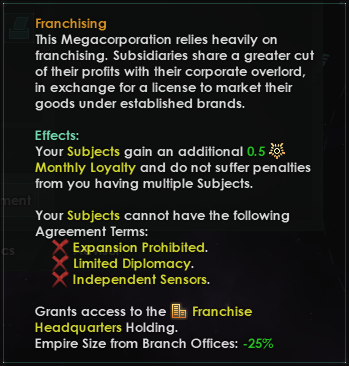

Overlord Holdings
In Cepheus, we’re expanding the branch office system from MegaCorp to be more flexible.
The corporate tab on planets is being replaced with a more versatile “Holdings” tab. For now, we have corporate and overlord holdings available here, but we have more future plans for this screen.
Much like branch office buildings, holdings are built on another empire’s colonies and can provide benefits to both empires. Much like criminal syndicate branch office buildings, some holdings might be far more beneficial to one side than the other. Each particular holding is planet-unique,
Corporate overlords can build both holdings and branch offices on their subjects’ colonies.

The Ministry of Truth provides two Overlord Propagandist jobs to the planet, which turn the subject’s Unity into Influence for their overlord…

…While holdings like the Material Ministry are disliked by subjects as the overlord claims a portion of the planet’s production for themselves…

…Still others, like the Aid Agency, are welcomed on the planet.
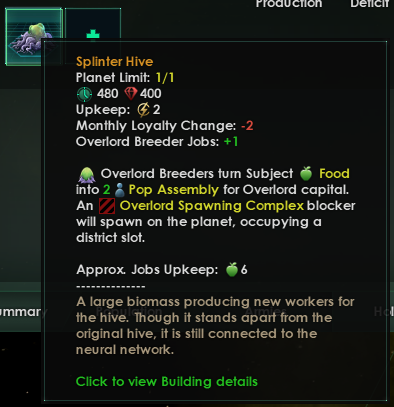
Hive overlords can build the most universally disliked holding (tied with one other), which takes a portion of the subject’s planet and dedicates it to a spawning complex.
We’re also adding some holdings associated with civics or origins.
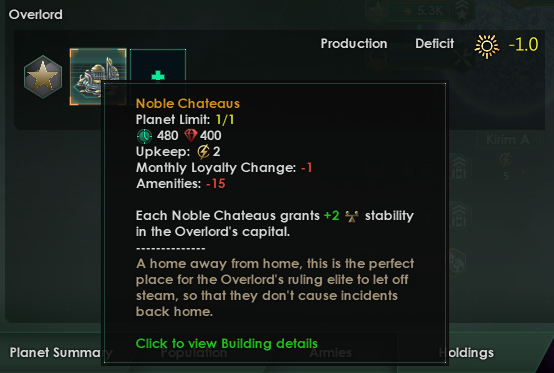
The Noble Chateaus of the Aristocratic Elite allow them to send troublemakers off to bother someone else’s planet instead of their own, much to the dismay of their hosts…

…Shared Burdens empires can spread their message through Communal Housing projects. How this is received depends largely on the ethics of the subject…

…And Gaia Seeders, who are gaining more terraforming flexibility in Cepheus as described in
Dev Diary #243[forum.paradoxplaza.com], can also beautify the worlds of their subjects. The subjects tend to like that - unless they’re Hydrocentric, of course.
Since there are over twenty different holdings, I’ll share some more in next week’s dev diary (including a machine specific one), and some more on social media as the Overlord reveals continue (though I’ll repost those in that week’s dev diaries as well).
It’s a very versatile system that we look forward to exploring more in the future.
The Future is Ours
That’s long enough for today. Next week we’ll talk about the advanced form of vassalization coming in Overlord called Specialist Empires.
Also,
starting with this dev diary[pdxint.at], we’re creating video versions on the
Stellaris Official YouTube Channel[pdxint.at] for those of you that prefer listening to them. Subscribe so you don’t miss them, and let us know what you think!
















